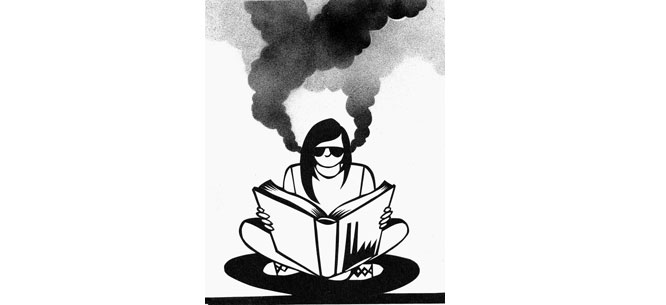Welcome to DU!
The truly grassroots left-of-center political community where regular people, not algorithms, drive the discussions and set the standards.
Join the community:
Create a free account
Support DU (and get rid of ads!):
Become a Star Member
Latest Breaking News
General Discussion
The DU Lounge
All Forums
Issue Forums
Culture Forums
Alliance Forums
Region Forums
Support Forums
Help & Search
Environment & Energy
Related: About this forumCli-Fi: Birth of a Genre
from Dissent magazine:
Cli-Fi: Birth of a Genre
By Rebecca Tuhus-Dubrow - Summer 2013

Books discussed in this essay:
Far North
by Marcel Theroux
Picador, 2010, 320 pp.
I’m With the Bears: Short Stories from a Damaged Planet
edited by Mark Martin
Verso, 2011, 208 pp.
Back to the Garden
by Clara Hume
Moon Willow Press, 2012, 271 pp.
The Healer: A Novel
by Antti Tuomainen, Henry Holt and Co., 2013, 224 pp.
Odds Against Tomorrow: A Novel
by Nathaniel Rich, Farrar, Straus and Giroux, 2013, 320 pp.
Solar
by Ian McEwan,
Nan A. Talese, 2010, 304 pp.
Wild Ones:
A Sometimes Dismaying, Weirdly Reassuring Story About Looking at People Looking at Animals in America
by Jon Mooallem
Penguin Press HC, 2013, 368 pp.
Makepeace Hatfield, the heroine of Marcel Theroux’s 2009 novel Far North, is one of the last survivors of a Siberian settlement. Her father was an early settler: an American Quaker who fled a decadent world for a frontiersman’s life. In the Siberian summer, he discovered fertile terrain, purple and brown, and water that “heaved with salmon,” as Makepeace recalls. “Nothing I’ve known in the Far North resembles the land of ice that people expected him to find here.”
We are in the future, or, at any rate, a future. The settlement has collapsed under the pressure of an influx of starving refugees. Makepeace—a stoic, androgynous woman—forges her own bullets and hunts wild pigs. When she witnesses the crash of a small plane, she sets out on her horse to find the rump of civilization that must have produced it. She is welcomed into a small religious community, then imprisoned at a work camp, and eventually makes her way to a dead metropolis.
Far North, hailed by the Washington Post as the “first great cautionary fable of climate change,” is one of the strongest of a recent crop of similar books, most of which are also post-apocalyptic or dystopian. But the novel is no straightforward eco-parable. Indeed, at one point, Theroux seems to have a little fun with green pieties. In the book, knowledge about the origins of the crisis is fuzzy, but Makepeace’s learned confidant offers an explanation:
Shamsudin said the planet had heated up. They turned off smokestacks and stopped flying….Factories were shut down….As it turned out, the smoke from all the furnaces had been working like a sunshade, keeping the world a few degrees cooler than it would have been otherwise. He said that in trying to do the right thing, we had sawed off the branch we were sitting on.
The novel also underscores the ironies of considering global warming an “environmentalist” cause. Today, conservationists rue human ubiquity and the loss of wilderness. Theroux reminds us that what’s finally at stake in our experiment with the climate is human achievement. In Makepeace’s time, wilderness is reclaiming cities; it’s the accumulated knowledge of millennia that verges on extinction. Aviation, for instance: “[T]o turn words and numbers into metal and make them fly—what bigger miracle can there be?” Makepeace marvels. “It’s a kind of heresy to say so, but I think our race has made forms more beautiful than what was here before us.” ..................(more)
The complete piece is at: http://www.dissentmagazine.org/article/cli-fi-birth-of-a-genre
InfoView thread info, including edit history
TrashPut this thread in your Trash Can (My DU » Trash Can)
BookmarkAdd this thread to your Bookmarks (My DU » Bookmarks)
1 replies, 672 views
ShareGet links to this post and/or share on social media
AlertAlert this post for a rule violation
PowersThere are no powers you can use on this post
EditCannot edit other people's posts
ReplyReply to this post
EditCannot edit other people's posts
Rec (2)
ReplyReply to this post
1 replies
 = new reply since forum marked as read
Highlight:
NoneDon't highlight anything
5 newestHighlight 5 most recent replies
= new reply since forum marked as read
Highlight:
NoneDon't highlight anything
5 newestHighlight 5 most recent replies
Cli-Fi: Birth of a Genre (Original Post)
marmar
Sep 2013
OP
pscot
(21,024 posts)1. Glad to see it
Maybe it's beginning to sink in. Or trickle down.